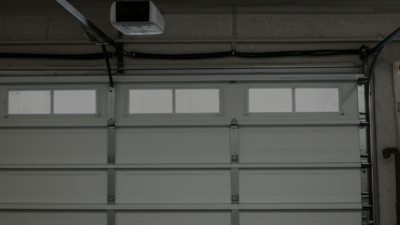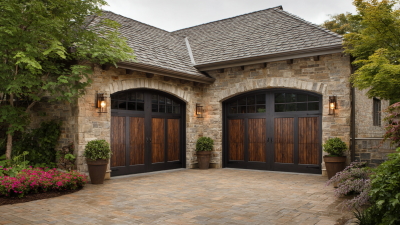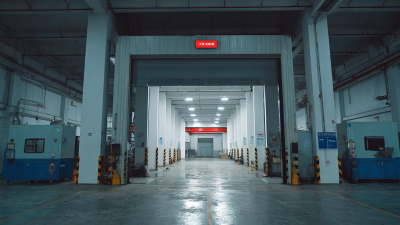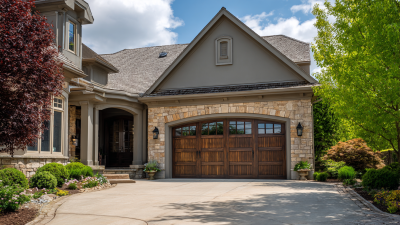When it comes to enhancing the functionality and convenience of your home, choosing the right garage doors openers is crucial. A garage door opener not only streamlines your daily routine by allowing for easy access to your garage, but it also adds an extra layer of security and safety. With various types of garage door openers available on the market, from chain-driven to belt-driven options, making an informed choice can be overwhelming. This ultimate guide aims to simplify the selection process by providing essential insights into the different types of garage door openers, their features, and benefits. Whether you’re looking to upgrade your existing opener or install a new one, understanding the key factors involved will help you unlock the perfect solution that meets your needs and enhances your lifestyle. Join us as we explore the vital aspects of garage door openers, ensuring you make a well-informed decision for your home.

When selecting the perfect garage door opener, there are several essential features that should guide your decision. First and foremost, consider the type of drive system that best suits your needs. Chain drive systems are robust and cost-effective but can be noisy. Screw drive systems offer a moderate level of noise and require less maintenance, whereas belt drive systems are the quietest, making them ideal for homes with living spaces adjacent to the garage. Depending on your priorities and budget, choosing the right drive system can enhance your overall experience.
Another critical feature to evaluate is the safety and security options available. Look for openers that come equipped with rolling code technology, which changes the access code with each use, preventing unauthorized entry. Additionally, consider models with safety sensors that detect obstacles in the garage door's path, automatically reversing it to prevent accidents. Lastly, conveniences like smartphone compatibility and battery backup options can significantly improve usability, allowing you to control your garage door remotely and ensuring it operates even during power outages. Prioritizing these features will help you choose an opener that not only meets your functional needs but also enhances the safety of your home.
When selecting a garage door opener, it's essential to understand the different types available and their respective pros and cons. The most popular types are chain drive, belt drive, and screw drive openers. According to the International Door Association, chain drive models are known for their durability and cost-effectiveness, making them a go-to choice for many homeowners. However, they tend to be noisier than other options, which may be a concern in quieter neighborhoods.
In contrast, belt drive openers are celebrated for their quiet operation, ideal for homes with living areas adjacent to the garage. While they generally come at a higher price point, their longevity and minimal maintenance requirements often justify the investment. On the other hand, screw drive openers are beneficial for their simplicity and lower maintenance needs, but they can be sensitive to temperature changes, affecting performance.
Tips: When deciding on a garage door opener, consider factors such as noise level, frequency of use, and available budget. For heavy doors, choose a more robust model, and don’t forget to check for smart features that enhance convenience. Always read customer reviews and seek products with high ratings for reliability and performance to ensure you make the best choice for your home.
When evaluating the security features of garage door openers, it's crucial to consider various aspects that contribute to the safety of your home. Modern garage door openers now come equipped with advanced technology that enhances security, such as rolling code technology, which changes the access code every time the opener is used, making it difficult for potential intruders to gain unauthorized access. Additionally, features like battery backup ensure that your garage door remains operational during power outages, further securing your premises.
Moreover, investing in smart garage door controllers allows for remote management and monitoring, adding an extra layer of protection. With smartphone integration, homeowners can receive alerts when their garage door is opened or closed, providing real-time visibility into their garage's status. This connectivity not only enhances security but also offers convenience, making smart models a popular choice for those looking to upgrade their garage door openers while prioritizing safety. By carefully assessing these security features, you can choose a garage door opener that aligns with your safety needs and lifestyle.
When it comes to installing a new garage door opener, one of the first decisions you’ll face is whether to tackle the project yourself or hire a professional. DIY installation can be appealing for those who enjoy hands-on work and want to save on costs. Most modern garage door openers come with detailed instructions, and many manufacturers provide online videos to guide you through the process. As long as you have basic tools, a bit of mechanical inclination, and a commitment to safety, you could successfully install the opener yourself.
On the other hand, hiring a professional can alleviate the stress and potential pitfalls of installation. Garage door openers are often more complex than they appear, and improper installation can lead to issues down the line, such as operational failures or safety hazards. Professionals have the expertise and experience to handle unforeseen challenges and ensure that the opener operates smoothly. They can also provide warranties and service guarantees that might not be available with DIY installations. Ultimately, the choice between DIY and professional installation hinges on your comfort level with home improvement tasks and your desire for convenience versus cost savings.
| Feature | Description | DIY Installation | Professional Installation |
|---|---|---|---|
| Power Type | Different power types include chain drive, belt drive, and screw drive. | Moderate difficulty; requires some tools and manual skills. | Fast and easy; professionals handle the details and ensure safety. |
| Smart Features | Options for smartphone control, security alerts, and compatibility with smart home systems. | Varies; depends on system integration capability. | Expert installation ensures optimal connectivity and setup. |
| Noise Level | Silent models available; ideal for homes with bedrooms above the garage. | Can be installed with absorbent materials to reduce noise. | Professionals can advise on the best noise-reducing models. |
| Safety Features | Automatic reversal, motion detection, and smartphone notifications enhance safety. | DIY installation can overlook some safety protocols. | Ensures all safety features are correctly calibrated and functioning. |
| Cost | Prices vary based on features and brand; typically ranges from $200 to $600. | Saves money on installation fees but costs may arise from errors. | Higher upfront cost but potential for a longer lifespan with proper installation. |
Proper maintenance is essential for extending the life of your garage door opener. Regularly inspecting the opener for any signs of wear or loose connections can help you catch potential issues before they escalate. It's advisable to check the alignment of the sensors to ensure they are functioning correctly, as misalignment can lead to operational problems. Additionally, lubricating the moving parts, such as the chain or drive belt, using a silicone-based lubricant will minimize friction and wear, ultimately enhancing the performance and longevity of the opener.
Another critical aspect of maintenance involves the power supply. Regularly inspect the power cord and outlet for any damage or corrosion, as a faulty power supply can hinder the opener's performance. Cleaning the track and removing any debris will facilitate smooth operation of the door, reducing strain on the opener mechanism. Lastly, it is important to test the safety features, such as the auto-reverse mechanism, to ensure they are functioning properly. Following these best practices will not only prolong the life of your garage door opener but also provide peace of mind and consistent reliability.
This bar chart illustrates the recommended maintenance frequency for various components of a garage door opener. Regular maintenance helps to extend the lifespan and ensure optimal performance of your garage door opener.






